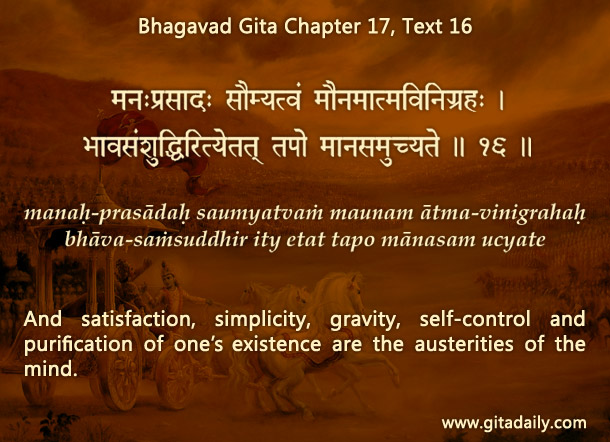Our satisfaction is often inversely proportional to our expectation. Suppose we go for a feast expecting a particular delicacy. If it is not included in the menu, we will feel dissatisfied. And that dissatisfaction will obstruct us in relishing the delicacies that are there in our plate.
To avoid such dissatisfaction, we need to replace the expectation-paradigm with the appreciation-paradigm. Appreciation enables us to focus on what we have, recognize its value and feel grateful, thereby fostering satisfaction. For example, if we contemplate that thousands of people are forced by poverty to sleep daily with half-empty stomachs, our dissatisfaction with the food we have will disappear. In general, by remembering that many people don’t have what we have, we can change our paradigm from expectation-centered to appreciation-centered.
Such paradigm-shifting thought-exercises can enable us to cultivate satisfaction, which, the Bhagavad-gita (17.16) states, is an austerity of the mind. That satisfaction is an austerity means that it is a choice we need to conscientiously make, just as we may conscientiously choose the austerity of a low-fat diet for losing weight.
The austerity of shifting our paradigm from expectation to appreciation becomes easier when we assimilate the Gita’s worldview. This worldview explains that we are at our core spiritual beings; we are parts of the all-attractive, all-loving supreme, Krishna; and we can find lasting fulfillment only in spiritual love for him. Applying this worldview, when we practice bhakti-yoga and use whatever gifts Krishna has given us in his service, we start savoring the sweetness of love for him. Gradually, we realize that with such a devotional disposition enriching us, we can always access inner happiness, irrespective of what we have or don’t have materially.
When we focus on appreciation of our spiritual gifts instead of expectation of better material things, we find lasting satisfaction.
To know more about this verse, please click on the image
Explanation of article:
Podcast:


Thank you